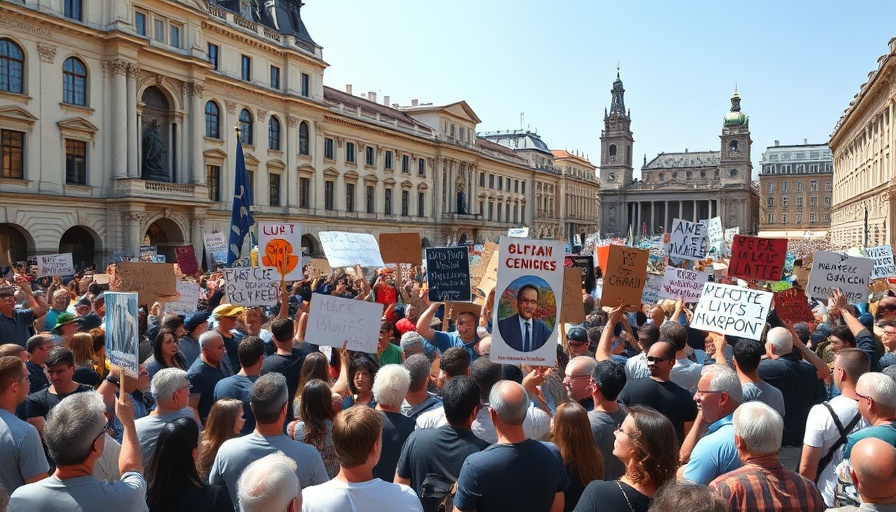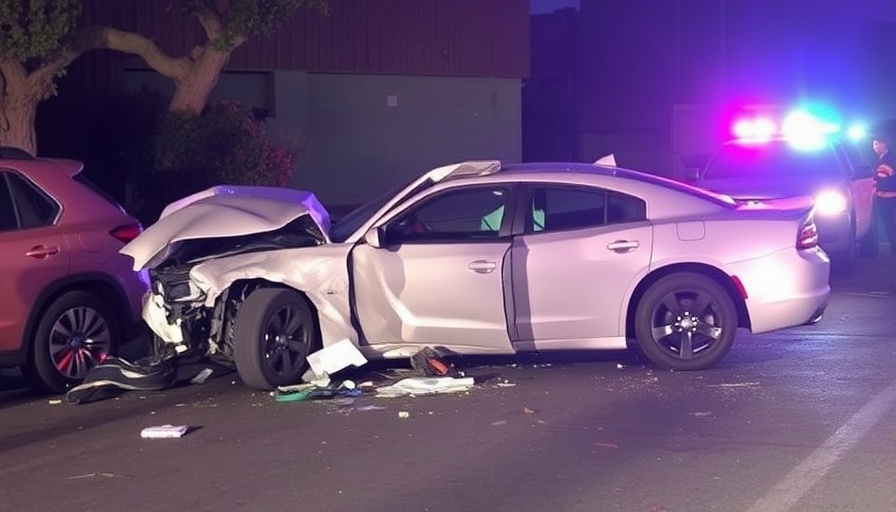
Uniting Voices Against Authority: The 'No Kings' Protest Movement
On a significant day for many across the United States, the 'No Kings Day' protests ignited a wave of demonstrations, reflecting deep-seated feelings against the current administration, specifically President Donald Trump. Thousands gathered from coast to coast to express their desire for democracy, immigrant rights, and a united front against perceived authoritarianism. This movement, which started amidst rising tensions over immigration policies, showcases the power of collective voices in the face of governmental authority.
The Symbolism Behind 'No Kings'
The theme of 'No Kings' resonates powerfully across various communities, particularly those concerned about how governmental decisions impact everyday lives. In Los Angeles, for example, the protests followed a series of federal immigration raids that have left many immigrants living in fear. Protesters used this day not just to rally against Trump, but to symbolize a broader fight against any form of oppressive rule. With banners and chants, they conveyed a message: America stands for democracy, not monarchy.
Protests Across America: A Unified Response
The scale of Saturday's protests drew attention, not just for their size, but for the unity they presented. From New York's bustling streets to the quieter towns of Virginia, demonstrators turned out in boisterous numbers, highlighting a shared commitment to civil rights. In cities like Chicago, Denver, and Austin, individuals joined arms marching in solidarity, underlining a personal connection to the broader theme of freedom and justice.
High Stakes: Safety Concerns Amidst Protest
While many protests remained peaceful and vibrant, the atmosphere in some locations was palpably tense. In response to potential violence, authorities prepared ahead of time, mobilizing the National Guard. For instance, in Culpeper, Virginia, the streets turned chaotic when a driver intentionally drove his SUV into a crowd, reflecting the high stakes involved in such demonstrations. Fortunately, most gatherings managed to remain peaceful, showcasing the protesters' dedication to their cause.
The Role of Local Leaders and Law Enforcement
Governors across the nation expressed their commitment to ensuring safety during these protests. Many local leaders issued statements promoting peaceful demonstrations and denouncing violence. This proactive stance indicates a growing recognition of the importance of protecting both citizens' rights to protest and the safety of bystanders alike.
From Local to National: A Broader Context
The 'No Kings' movement aligns with ongoing struggles across various spheres, particularly those revolving around immigration and civil rights. By linking local protests with national conversations, participants underscored the need for systemic change. As immigrants continue to face immediate threats under current policies, the urgency for reform remains critical. This connection highlights a powerful trend: local communities banding together for a national cause.
The Power of Demonstrations: Reflections and Next Steps
As the dust settles from the marches, one thing becomes clear: the need for continued dialogue is paramount. The energy and spirit shown during the demonstrations represent not just a reaction to current events but a foundational desire for improvement in the governance of the country. As protesters return to their daily lives, the question remains: how can this energy be harnessed for long-term change?
Empowering Change: What’s Next?
The events of 'No Kings Day' serve to remind us that every voice matters. Whether by participating in local grassroots efforts, advocating for immigrant rights, or simply engaging in discussions around civil rights, individuals have the power to make an impact. The chants of ‘Trump must go now’ were not just expressions of frustration but calls for action—a drive for citizens to step into the ongoing political discourse.
It's crucial to continue this momentum. For those who feel compelled to act, considering involvement in community organizations and pressure campaigns can lead to meaningful change. Every action, no matter how small, contributes to the larger conversation around justice and democracy.
 Add Row
Add Row  Add
Add 



Write A Comment